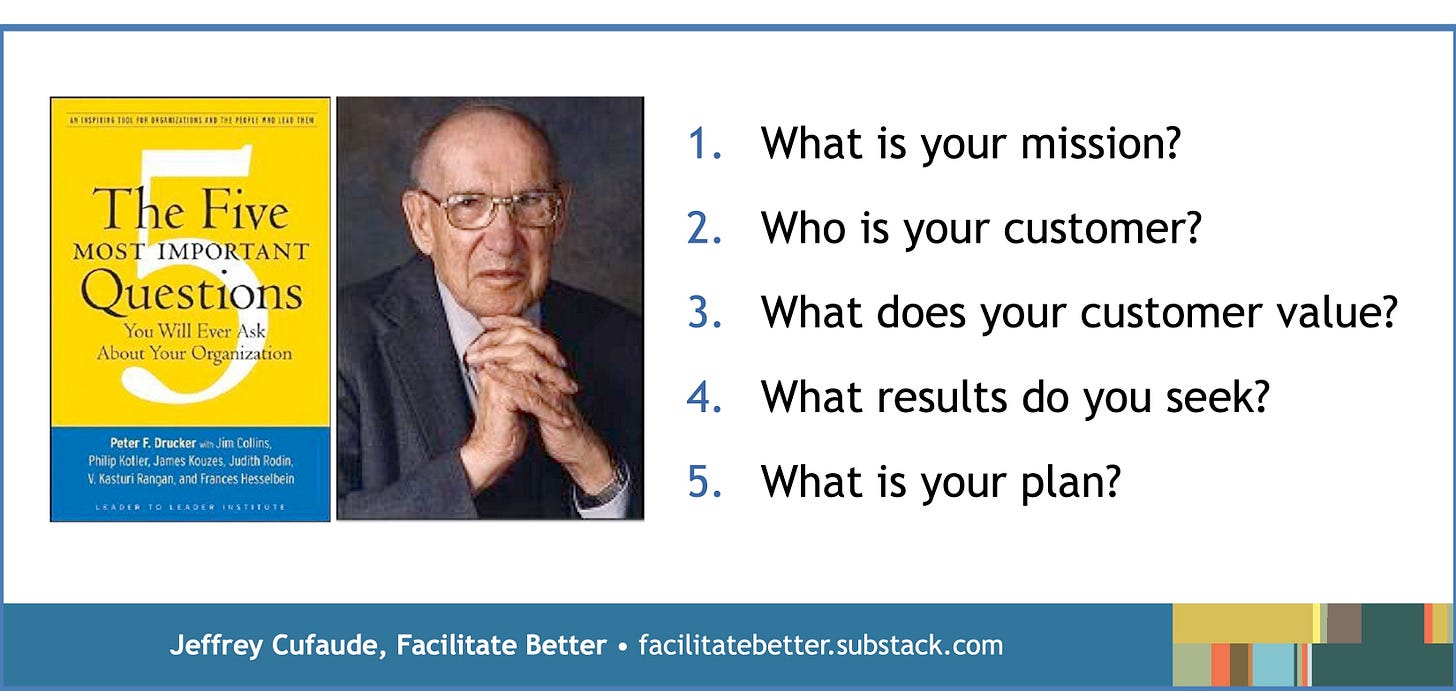A Dozen Timeless Questions for More Valuable Strategy Conversations (Facilitation Friday #66)
Every facilitator needs a healthy supply of questions that foster better strategic thinking and decisions.
A challenge with strategic planning sessions is that once the vision, goals, and objectives are identified, the good thinking that created them may stop. You can almost hear a sigh of relief in unison from planning session participants: “Whew, glad that's over. Now we don't have to think strategically again until the next time one of these sessions rolls around.”
Uh oh. One reason why strategic plans often do not yield the commitment, action, or results they are meant to produce is that the strategic conversations end when the plan is approved. But any answers identified during a planning process are temporary by nature. While individuals act on the objectives and tactics for each goal, continued contemplation of core strategic questions should continue.
The Concept of Timeless Perma” Questions
Most organizations can probably identify a handful (say 6-12) of what I call perma questions. A perma (nent) question is one unlikely to ever go out of style because it is so fundamental to almost any organization. Value is generated whenever it is asked and answered, so it makes sense to do so regularly. Routinely incorporate them into relevant meetings and conversations to complement periodic strategic planning efforts .
Having a healthy supply of these questions is important. Like many facilitators and leaders, I often use Peter Drucker's Five Most Important Questions as a starting point. Over the years, I've developed a dozen additional questions to draw on during strategy conversations, ones that while timeless in nature almost always can generate new and timely responses.
When well-stocked with worthwhile perma questions, you can then (1) incorporate them into regular meetings, brainstorming sessions, strategic planning sessions, et al; (2) help groups establish process(es) for screening the ideas such discussions produce (these decision-making rules can help); and (3) support others using them in their strategic planning and thinking efforts.
My 12 Timeless Questions
How can you better align your efforts and organizational culture with your core purpose and core values?
What do your members, customers, or stakeholders (current and/or future) most need or value and how can you increase the benefits and value they receive from your efforts?
What infrastructure ($, time, people) is required to produce the future you are trying to create and the results you want to produce? How might you better engage relevant parties in creating and producing these results?
What are the most significant issues in various time horizons that could effort your mission, strategies, goals, and operations? How should you address them and/or adapt your efforts?
How can you further enable connections, facilitate community, and strengthen relationships among your members, customers, stakeholders, and collaborators?
How can you better disseminate information so that it captures the attention, interest, consumption, and application you seek?
What processes and systems could you implement to more efficiently and effectively do your work?
What current successes, it they were to diminish or disappear, would have the most devastating consequences? What might you want to do now as a result?
What criteria should guide any review of which programs, services, or publications should be retired?
What keeps your employees, collaborators, and/or volunteers from making their best contributions to your work and how can you remove or minimize those obstacles?
What is most holding you back right now, and what might you do about it?
What one mission- or vision-related result, while seemingly impossible, would make a tremendous difference it was achieved?
Bottom Line
Determining strategic priorities and plans is useful, but insufficient to achieve and maintain success, particularly during turbulent times. Ongoing exploration of timeless strategic questions can help individuals and organization identify timely opportunities to leverage and tactical adjustments to make. Every facilitator needs an ample supply of these questions in their toolkit.
Getting in Action
Develop your own list of timeless questions, drawing on those provided here, as well as ones you generate for inclusion.
What agenda items would you include if you were designing a session intended to help participants develop ways to keep strategic conversations occurring while still executing on current priorities?
What elements do you associate with an organization that has a highly strategic culture? How might you use this information when designing and facilitating strategic planning efforts?
© Facilitate Better and Jeffrey Cufaude. All rights reserved.
To affordably license this content for reprint on your site or in electronic or print communications or to contact me regarding customized facilitation skills workshops or consultations, complete this form.





